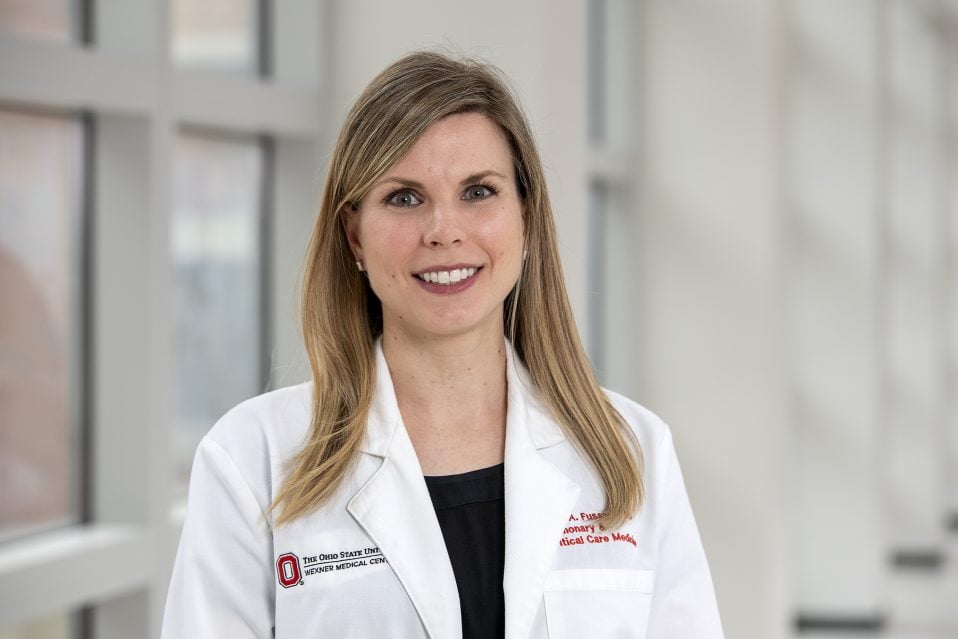Lynn A. Fussner, MD
Assistant Professor at The Ohio State University (OSU), Division of Pulmonary, Critical Care, and Sleep Medicine
Lynn A. Fussner, MD, Assistant Professor at The Ohio State University (OSU), Division of Pulmonary, Critical Care, and Sleep Medicine, has been awarded a one-year grant from the Vasculitis Foundation (VF) for her study, “Role of Monocytes and Alpha-1 Antitrypsin in ANCA-Associated Vasculitis.” Dr. Fussner’s goal is to identify better ways of striking a balance between disease control and risk of treatment, through markers of vasculitis activity and different targets for treatment. Dr. Fussner is also the Pulmonary Lead at OSU’s Multidisciplinary Vasculitis Clinic.
Antineutrophil cytoplasmic antibody (ANCA)-associated vasculitis is a group of autoimmune diseases (granulomatosis with polyangiitis, eosinophilic granulomatosis with polyangiitis, and microscopic polyangiitis) that cause blood vessel damage. Because ANCA-associated vasculitis involves severe inflammation in multiple parts of the body, it’s usually treated with medications that suppress the immune system to try and curb the inflammation. It can be a life-threatening disease and the treatment regimen can be intensive.
“One major drawback is that suppressing the immune system also makes people more susceptible to infections, which can be life-threatening themselves,” Dr. Fussner said. “In addition, steroids have played a major role in the treatment of vasculitis and many other inflammatory diseases but have many side effects beyond infections, and these long-term effects can have a big impact on quality of life, even if the vasculitis itself is well-controlled.”
Monocytes are cells in the blood that respond to potential problems such as infection. “They send signals telling other cells to come help address those problems, including neutrophils and lymphocytes, both of which are important in vasculitis, leading to a bigger inflammatory response,” Dr. Fussner explained. Alpha-1 antitrypsin is a protein that interacts with proteinase 3 (PR3)—one of the major targets of ANCA—and has many other anti-inflammatory roles in the body.
Through her research, Dr. Fussner plans to look at several aspects of inflammation in ANCA-associated vasculitis, including how antibodies (ANCA) “see” PR3 on immune cells, whether different parts of PR3 are shown depending on the type of cell. “We will also look at whether a person’s genetics influence how ANCA interact with immune cells, based on whether they have a normal or abnormal version of alpha-1 antitrypsin,” she added.
The research team supporting Dr. Fussner in this work includes Ulrich Specks, MD, Mayo Clinic; Peter Merkel, MD, MPH, Penn Medicine, Mark Wewers, MD, OSU Wexner Medical Center, and Kymberly Gowdy, MS, PhD, OSU College of Medicine. Other key collaborators are Alexa Meara, MD, and Salem Almaani, MBBS, who Dr. Fussner works closely with at OSU’s vasculitis clinic.
“Understanding of vasculitis has grown tremendously thanks to research over the last few decades,” Dr. Fussner said. “We hope to build upon that foundation to continue to move toward more targeted and individualized treatments. Alpha-1 antitrypsin genetics have been shown to impact the risk of developing ANCA-associated vasculitis, so we want to explore that further.” The ultimate hope is that this research will provide information to support future clinical trials in vasculitis, working toward new and/or safer treatment options.
In November of 2020, a California family contributed a generous donation in support of Dr. Fussner’s research goals. “We have experienced firsthand great care from numerous physicians across several disciplines and a range of geography,” the family wrote. “Three doctors have stood out for us and we consider them to be true lifesavers for our family.” They include Thomas Diamant, MD, a pulmonologist in Newport Beach, California; Kathy Karamlou, MD, a rheumatologist in Newport Beach, California; and Tracy Brenner, MD, a rheumatologist in Indianapolis, Indiana. “Both [rheumatologists] have been stalwart guardians and managers of successful GPA treatment for our son.”
In December 2017, OSU’s Wexner Medical Center established a multidisciplinary vasculitis clinic to provide enhanced care for patients with vasculitis. The clinic has grown since then and is now seeing approximately 120 patients with vasculitis over the last year. “It has been great to work closely with Dr. Almaani (nephrology) and Dr. Meara (rheumatology) to develop comprehensive care plans suited to each patient,” Dr. Fussner said. “We continue to be involved in clinical trials, and Dr. Almaani and Dr. Meara also have active research looking at kidney features in vasculitis and, importantly, patient perspectives on vasculitis treatment and outcomes.”







